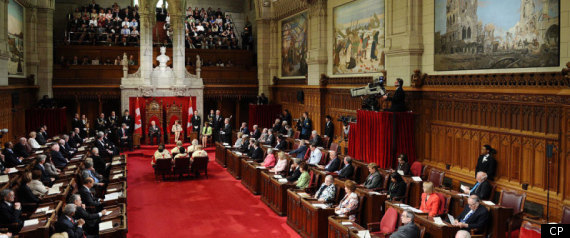The Senate Legal and Constitutional Affairs committee passed Conservative amendments to the government's controversial omnibus crime legislation Monday morning, signalling the government's admission that at least some parts of the bill need changing.
C-10, an omnibus bill folding together some nine previous pieces of Conservative legislation the government did not pass in previous minority Parliaments, was pushed through the House of Commons before Christmas and is in the final stages of review before the Senate committee.
The committee is mid-way through its clause-by-clause review of the 152-page bill's provisions and could complete its work by the end of the day Monday.
The Conservative amendments passed so far include changes to the provisions allowing victims of terrorism to sue those responsible for the crimes.
These amendments, introduced by Conservative Senator Bob Runciman, mirror an attempt by Public Safety Minister Vic Toews in early December to amend the bill at third reading in the House of Commons. That attempt failed when House of Commons Speaker Andrew Scheer ruled the amendments should have been introduced and passed at the committee stage, when bills are usually amended before being sent back to the House of Commons for final passage.
In fact, similar amendments were introduced at the Commons justice committee by Liberal MP and former justice minister Irwin Cotler, but were rejected by Conservative MPs on the committee. Government House Leader Peter Van Loan insisted to reporters later in December that Cotler's amendments were not the same as the government's.
Other Liberal amendments up for the Senate committee's consideration have failed to pass.
When the Senate committee finishes its work, the full Senate needs to pass the bill as amended. The bill then returns to the House of Commons for a vote to concur with the changes, which may include additional debate, before it receives Royal Assent.
The government may limit the time allocated for debating any changes recommended by the Senate. During the 2011 election campaign, the Conservatives promised to pass this bill within 100 sitting days of Parliament, which leaves the government only a few weeks to fulfil its pledge.
Last Wednesday, Justice Minister Rob Nicholson vowed the government will keep the bill's mandatory minimums provisions despite warnings from provinces, crime experts and American jurisdictions who have gone down the same road that these kinds of sentencing rules are a very expensive burden on the courts and corrections services, and don't actually solve the problems they're meant to address.
Original Article
Source: Huff
Author: cbc
C-10, an omnibus bill folding together some nine previous pieces of Conservative legislation the government did not pass in previous minority Parliaments, was pushed through the House of Commons before Christmas and is in the final stages of review before the Senate committee.
The committee is mid-way through its clause-by-clause review of the 152-page bill's provisions and could complete its work by the end of the day Monday.
The Conservative amendments passed so far include changes to the provisions allowing victims of terrorism to sue those responsible for the crimes.
These amendments, introduced by Conservative Senator Bob Runciman, mirror an attempt by Public Safety Minister Vic Toews in early December to amend the bill at third reading in the House of Commons. That attempt failed when House of Commons Speaker Andrew Scheer ruled the amendments should have been introduced and passed at the committee stage, when bills are usually amended before being sent back to the House of Commons for final passage.
In fact, similar amendments were introduced at the Commons justice committee by Liberal MP and former justice minister Irwin Cotler, but were rejected by Conservative MPs on the committee. Government House Leader Peter Van Loan insisted to reporters later in December that Cotler's amendments were not the same as the government's.
Other Liberal amendments up for the Senate committee's consideration have failed to pass.
When the Senate committee finishes its work, the full Senate needs to pass the bill as amended. The bill then returns to the House of Commons for a vote to concur with the changes, which may include additional debate, before it receives Royal Assent.
The government may limit the time allocated for debating any changes recommended by the Senate. During the 2011 election campaign, the Conservatives promised to pass this bill within 100 sitting days of Parliament, which leaves the government only a few weeks to fulfil its pledge.
Last Wednesday, Justice Minister Rob Nicholson vowed the government will keep the bill's mandatory minimums provisions despite warnings from provinces, crime experts and American jurisdictions who have gone down the same road that these kinds of sentencing rules are a very expensive burden on the courts and corrections services, and don't actually solve the problems they're meant to address.
Original Article
Source: Huff
Author: cbc

No comments:
Post a Comment